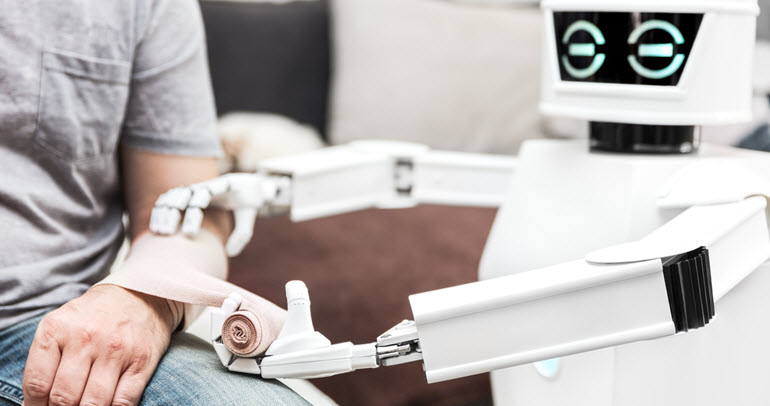
From The Terminator to HER, the thought of artificial intelligence (AI) walking among us has always been portrayed in movies as futuristic. However, AI has slowly crept into our day-to-day world. Without realizing it, many of us have already invited AI into our homes through Alexa playing your favorite song or turning down the heat in your house via Nest, on our phones (Siri) and, in many cases, onto our bodies (smartwatch).
AI has potential to help us live healthier and longer
Although there are some hesitations around the possibility of AI taking control (have you seen I, Robot?), at the end of the day, AI makes our lives easier and, quite frankly, has the potential to help us live longer and healthier lives.
The healthcare sector has jumped headfirst into developing groundbreaking AI technology—and why wouldn’t they with the projection for clinical health AI applications to potentially create $150 billion in US savings by 2026? AI is quickly changing the way we approach medicine and reinventing modern healthcare.
Although your next doctor’s appointment might not be with a robot, you will likely experience AI healthcare within your lifetime.
Five Ways AI Is Changing Healthcare
- Placing healthcare at your fingertips
Imagine you wake up, your throat feels like it’s on fire and you’re coughing every two seconds. You are sick! You know you need to see the doctor, but the thought of trying to get a last-minute appointment or going to urgent care makes you feel worse than you already do. What if, instead of going to the doctor, the doctor comes to you? More and more patients are taking advantage of telemedicine options to “see a doctor” in the comfort of their own home. Additionally, the future of virtual AI apps could allow for a complete patient work-up via your cell phone. By collecting data such as weight, temperature, symptoms as well as ear and throat images, a diagnostic impression could be collected and electronically sent to a healthcare provider, with a breakdown of predicted illness and treatment options. You then receive a video consultation with a licensed healthcare provider to confirm the information, verify diagnosis and create a treatment plan—potentially all without leaving your bed.
- Monitoring babies and helping parents sleep soundly
Like many new parents, I worried constantly about my new baby. And, on more than one occasion, I would sneak into her room at night to make sure she was still breathing. Needless to say, I was more than willing to fork over a few hundred dollars for a smart monitor sock that would alert me when something is wrong, like low oxygen or an abnormal heart rate. Through the health sensors on the smart sock, I was able to easily track my baby’s well-being through the app on my phone and no longer had to worry about waking her up when checking on her at night—giving both me and my husband a more restful and peaceful night.
- Guiding the surgeon’s hand and delivering better patient outcomes
Robotic surgeries are probably the most common AI in healthcare. Since the early ’80s, industrial robots have been assisting surgeons, and last year over 1 million procedures worldwide were done using surgical robots. From hair implants to brain surgery, robot-assisted surgery enhances the capabilities of surgeons, allowing them to use smaller tools and make more precise incisions. Other benefits from robotic surgeries include reduced pain and discomfort after surgery and often a faster recovery time.
- Unearthing hidden patterns for a quick and early cancer diagnosis
We know that an early and correct cancer diagnosis can massively increase patient survival. Although AI will not replace your physician, it could assist in making quick and accurate diagnoses within breast and lung cancer. Companies are working on new technology with algorithms that can search for cancer patterns that reduce the chance of a false negative or missed diagnosis. This new technology could help physicians quickly and correctly diagnose every patient, every time.
- Partnering with big pharma to quickly develop new treatments
Over the last few years, AI has defined how scientists are developing new drugs in both biotech and pharma. Millions of dollars are put into drug research, and with only about 13.8% of drugs successfully passing clinical trials, pharma companies are turning to AI to help increase their success rate. Companies like Pfizer, Sanofi and Genentech are all using AI for a quicker, cheaper and more effective way to drug discovery by identifying patterns hidden in large volumes of data. Although AI is still new to the world of pharma, it’s already starting to impact companies in big ways:
-
- Roche and GNS Healthcare are using AI to focus on cancer therapy. By using machine learnings to review high volumes of patient data, AI has the ability to identify and create personalized targeted cancer therapy.
- Pfizer and IBM are partnering and using Watson for a Drug Discovery cloud-based platform to collect and analyze data. With this tool they can quickly review millions of articles and shorten the time frame to identify new drugs.
- AstraZeneca and BenevolentAI are using AI for the discovery and development of new treatments for chronic kidney disease and idiopathic pulmonary fibrosis.
“Although I don’t believe AI will ever take the place of a physician, it will change the way we approach patient care.”
– Family Practice Physician
AI is quickly changing healthcare, from personalized medication to better diagnoses, and the benefits of incorporating AI in healthcare will be felt by both patients and healthcare professionals. As a researcher, I know there will be industry challenges (personal data security, the emotional aspect, human learning curve, FDA standards, and more), but I believe the need to understand patients’ and healthcare professionals’ views and understanding of AI now is important for a smoother and easier transition in the future.
Want to know more about how AI will impact your consumers? Send us a note for more information.









